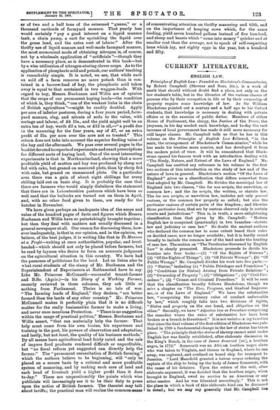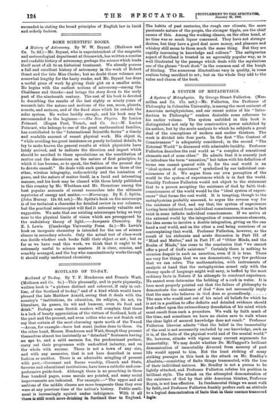CURRENT LITERATURE.
ENGLISH LAW.
Principles of English Law : Founded on Blackstone's Commentaries, by Robert Campbell (Stevens and Sons, 20s.), is a work of merit that should without doubt find a place, not only on the law student's table, but in the libraries of the various classes of persons who by their occupation in life or by their ownership of property require some knowledge of law. As Sir William Blackstone pointed out a century and a half ago to his Oxford students, that knowledge is necessary in dealing with private affairs or in the exercise of public duties. Members of either House of Parliament, the clergy, the Justice of the Pence, the juryman, in his day needed such knowledge, and to-day the vast increase of local government has made it still more necessary for still larger classes. Mr. Campbell tells us that he has in this volume on the Principles of English Law followed, "in the main, the arrangement of Blackstone's Commentaries," while he has made his treatise more concise, and has developed it from the modern point of view. It will be remembered that Black- stone opened his famous work with an introduction dealing with "The Study, Nature, and Extent of the Laws of England." Mr. Campbell has omitted any reference in his volume to the first two sections of this introduction on the study of law and of the nature of laws in general. Blackstone's section "Of the Laws of England" gives us a classification that differs somewhat from that adopted by Mr. Campbell. He divides the municipal law of England into two classes, "the /ex non script a, the unwritten, or common law; and the ler scripta, the written, or statute law. The lea non scripta, or unwritten law, includes not only general customs, or the common law properly so called ; but also tho particular customs of certain parts of the kingdom ; and likewise those particular laws, that are by custom observed only in certain courts and jurisdictions." This is, in truth, a more enlightening classification than that given by Mr. Campbell : "Modern English law is comprised (practically) in two branches—statuto law and judiciary or case law." No doubt the ancient authors who declared the common law to some extent based their rules on decided cases, now no longer available ; but it is hardly sound broadly to include the common law of the land under the heading of case law. The section on "The Territories Governed by English Law" is clearly presented. Blackstone proceeds to divide his treatise into four books :—(1) "Of the Rights of Persons" ; (2) "Of the Rights of Things"; (3) "Of Private Wrongs"; (4) "Of Public Wrongs." Mr. Campbell divides his work into five parts :—
(1) "Status," including (a) "Public Privileges and Franchises "; (b) "Conditions (or Status) Arising from Private Relations " ;
(2) "Ownership of Property " ; (3) " Obligations " ; (4) "Civil Pro- cedure"; (5) "Crimes and Criminal Procedure." It will be seen that the classification broadly follows Blackstone, though we miss a chapter on "The Rise, Progress, and Gradual Improve- me:_ts of the Laws of England." We have the substantive law, "comprising the primary rules of conduct enforceable by law," which roughly falls into two divisions of rights, "Status and property on the one hand, and obligation on the other." Secondly, we have "Adjective taw or Procedure comprising the remedies where the rules of substantive law have been broken or a breach is threatened." It is not uninter,a Sing to notice that since the final volume of the first edition of Blackstone was pub- lished in 1769 a fundamental change in the law of status has taken place. "The principle that the status of slavery cannot exist under English law was finally established, after elaborate discussion in the King's Bench, in the case of James Somerset [sic], a heathen negro, in 1772." Somersett was an Afritan heathen negro slave who was taken to Virginia, and thence to England, where he ran away, was captured, and confined on board ship for transport to Jamaica. "Lord Mansfield granted a habeas corpus ordering the captain of the ship to bring up the body of James Somersett, with the cause of his detainer. Upon the return of the writ, after elaborate argument, it was decided that the heathen negro, when brought to England, owed no service to an American or any other master. And he was liberated accordingly." This is not the place in which a book of this elaborate kind can be discussed in detail I but we mety say paarali,y that gr. Compbell has
succeeded in stating the broad principles of English law in lucid and orderly fashion.





















































 Previous page
Previous page